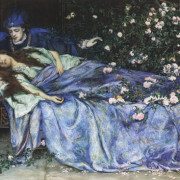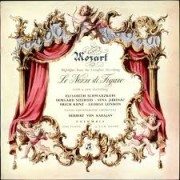Posts
September 27, 2017
Contact:
Katherine Esposito 263-5615
University Opera turns to music and theater of the mid-20th century with A KURT WEILL CABARET
This fall, University Opera takes a short break from strictly operatic offerings as it turns to the music of Kurt Weill (1900-1950). A KURT WEILL CABARET, a pastiche of 21 solos and ensembles from Weill’s many diverse works, will be presented at Music Hall on the UW-Madison campus on October 27 at 7:30pm, October 29 at 3:00pm and October 31 at 7:30pm. University Opera Director David Ronis will direct the show. Chad Hutchinson, adjunct professor of orchestras, will conduct. Musical preparation will be by UW-Madison vocal coach, Daniel Fung.
Born in Germany, Weill achieved early fame through works created in partnership with the playwright Berthold Brecht, most notably, Die Dreigroschen Oper (The Threepenny Opera) and Aufstieg und Fall der Stadt Mahagonny (Rise and Fall of the City of Mahagonny). Forced into exile by the rise of Hitler in 1933, Weill spent a few years in Paris before eventually moving to New York. In the United States, he found success on Broadway through collaborations with such lyricists as Ira Gershwin, Langston Hughes, and Ogden Nash on such shows as Lady in the Dark, One Touch of Venus, and the opera Street Scene. Several roles in these productions were premiered by his wife, Lotte Lenya, the singing actress who championed his works even after their divorce and his death.

Kurt Weill image courtesy German Federal Archive.
A KURT WEILL CABARET is a unique production, assembled by Ronis, that contains no one dramatic through-line. Instead, the pieces that comprise the evening, taken out of their usual context, are juxtaposed so as to create multiple mini-narratives. There are no set characters; relationships develop and dissolve as the evening progresses. The show is organized into three sections, each highlighting themes of Weill’s oeuvre. The first of these works its way through a series of dysfunctional yet comic relationships between men and women. The metaphor of travel underscores the second section, which explores themes of longing, disappointment, and finally hope. The characters involved are tough and world weary – their hopes and aspirations often dashed by swift doses of reality. Nevertheless, there is a sense that all is not lost and redemption is possible. The third and final portion of the show returns to lighter fare that affirms that true love and happiness is possible, especially when there’s ice cream involved!
The musical numbers of A KURT WEILL CABARET, sung in English, German, and French, include “The Saga of Jenny,” “Surabaya Johnny,” I’m a Stranger Here Myself,” “Whiskey Bar/Alabama Song,” “J’attends un navire,” “Foolish Heart,” “Youkali,” “Denn wie man sich bettet,” “A Rhyme for Angela,” “It Never Was You,” and “My Ship.”
The cast features one guest artist, Alec Brown, and twelve UW-Madison students: Matthew Chastain, Jake Elfner, Tim Emery, Talia Engstrom, Eliav Goldman, Courtney Kayser, Sarah Kendall, Miranda Kettlewell, Jeffrey Larson, Lauren Shafer, Emily Vandenberg, and Emily Weaver.
The production will be designed by Greg Silver with lighting by Aimee Hanyzewski. Sydney Krieger and Hyewon Park will be the costume designers, Laura Meinders the props designer, and the production stage manager will be Shelly Sarauer. Others on the production staff include Thomas Kasdorf, rehearsal pianist; Courtney Kayser, operations manager for University Opera; and Ethan White, lighting board operator.
Following each performance of A KURT WEILL CABARET, audience members will be given the opportunity to ask questions and discuss the performance during talk-back sessions with the cast and members of the artistic staff.
Tickets are $25.00 for the general public, $20.00 for senior citizens and $10.00 for UW-Madison students, available in advance through the Campus Arts Ticketing office at (608) 265-ARTS and online at the UW box office. Tickets may also be purchased in person at the Wisconsin Union Theater Box Office Monday-Friday, 11:30 a.m.-5:30 p.m. and Saturdays, 12:00-5:00 p.m. and the Vilas Hall Box Office, Monday-Friday, 11:30 a.m.-5:30 p.m., and after 5:30 p.m. on University Theatre performance evenings.
Because shows often sell out, advance purchase is recommended. If unsold tickets remain, they may be purchased at the door beginning one hour before the performance. The Carol Rennebohm Auditorium is located in the Music Hall, at the foot of Bascom Hill on Park Street.
Click here for parking information.
University Opera is a cultural service of the School of Music at the University of Wisconsin-Madison whose mission is to provide comprehensive operatic training and performance opportunities for our students and operatic programming to the community. For more information, please contact opera@music.wisc.edu. Or visit the School of Music’s web site at music.wisc.edu.
January 31, 2017
Contacts:
David Ronis ronis@wisc.edu
Katherine Esposito kesposito@wisc.edu
Fresh from winning two major awards in the 2015-16 National Opera Association Competition, University Opera will present Benjamin Britten’s gothic ghost story, The Turn of the Screw, to round out its season. In this, Britten’s last chamber opera, based on the Henry James novella of the same title, terror takes unexpected forms. Premiered in 1954, The Turn of the Screw tells of a young governess who is hired to care for two children in an isolated country house in late 19th century England. She soon realizes that the children are haunted by secrets and spirits that harm them in very real ways and she takes it upon herself to defend them. In so doing, she is forced to confront the demons she perceives as threats, as well as her own internal ones.

Benjamin Britten in the mid-1960s (photograph by Hans Wild).
The Turn of the Screw will be presented in English for three performances, all with projected supertitles. March 3 at 7:30 PM, March 5 at 3:00 PM, and March 7 at 7:30 PM at Music Hall on the UW-Madison campus. David Ronis, inaugural Karen K. Bishop Director of University Opera, will direct and graduate conducting assistant Kyle Knox will conduct the 13-member chamber orchestra. Musical preparation will be by University Opera’s new vocal coach, Daniel Fung.
Tickets are $25.00 for the general public, $20.00 for senior citizens and $10.00 for UW-Madison students, available in advance through the Campus Arts Ticketing office at (608) 265-ARTS and online here.
Just as James’s novella is particularly notable for the ambiguity of its story, so is Britten’s opera. Are the ghosts real? Or are they creations of the Governess’s delusional mind? Are the children as innocent as they originally appear, or are they part of a larger, scheme of evil? What of Mrs. Grose, the housekeeper, who reveals some information, but not enough to form a coherent backstory? And the ghosts themselves – Peter Quint and Miss Jessel – what motivates them? What do they have at stake? All these questions hover as this compelling psychological thriller unfolds.
Following each performance of The Turn of the Screw, there will be a talkback session with the cast and members of the artistic staff. Audience members will be given the opportunity to ask questions and discuss the issues raised by this opera.
Leading the cast and alternating the role of the Governess will be Katie Anderson and Erin Bryan. Alec Brown will play the roles of the Prologue/Peter Quint, Anna Polum will be Miss Jessel and Cayla Rosché will be Mrs. Grose. Elisheva Pront and Emily Vandenberg will alternate as Flora and guest artists Simon Johnson and Amitabha Shatdal will share the role of Miles.
The production will be designed by Frank Schneeberger with lighting design by John Frautschy. Sydney Krieger and Hyewon Park will design costumes, Meg Huskin will be the assistant director, Holly Berkowitz the dramaturg, and the production stage manager will be Meghan Stecker. Other staff include Chan Mi Jean and Satoko Hayami, rehearsal pianists; Erin Bryan, operations manager for University Opera; Teresa Sarkela, scenic charge; and Ethan White, lighting board operator.
Tickets are $25.00 for the general public, $20.00 for senior citizens and $10.00 for UW-Madison students, available in advance through the Campus Arts Ticketing office at (608) 265-ARTS and online here.
Tickets may also be purchased in person at the Wisconsin Union Theater Box Office Monday-Friday, 11:30 a.m.-5:30 p.m. and Saturdays, 12:00-5:00 p.m. and the Vilas Hall Box Office, Monday-Friday, 11:30 a.m.-5:30 p.m., and after 5:30 p.m. on University Theatre performance evenings. Because shows often sell out, advance purchase is recommended.
If unsold tickets remain, they may be purchased at the door beginning one hour before the performance.
The Carol Rennebohm Auditorium is located in Music Hall, at the foot of Bascom Hill on Park Street.
University Opera is a cultural service of the Mead Witter School of Music at the University of Wisconsin-Madison, whose mission is to provide comprehensive operatic training and performance opportunities for our students and operatic programming to the community. For more information, please contact opera@music.wisc.edu. Or visit the School of Music’s web site at music.wisc.edu.
University Opera scores again with national recognition
Awards for two shows in 2015-2016
UW-Madison’s University Opera is on a roll. Both shows from last year, Transformations and Mozart’s Le nozze di Figaro, have won awards in the National Opera Association’s (NOA) Opera Production Competition for 2015-2016. It is the second year in a row that UW-Madison has garnered an award from NOA, and the first time that each production was separately recognized. University Opera produces only two operas each year.
October 2015’s Le nozze di Figaro, with orchestra conducted by James Smith, placed second in Division IV, and March 2016’s Transformations, conducted by graduate assistant conductor Kyle Knox, garnered a first place award in Division III.
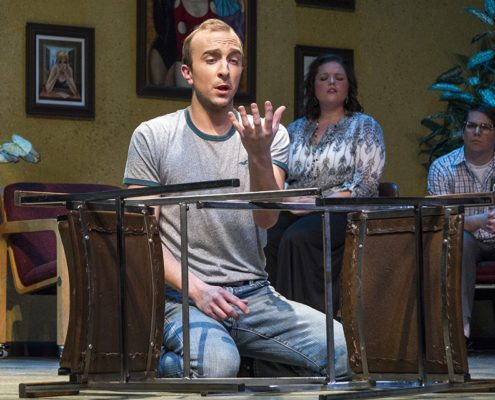
Dress rehearsal for “Transformations.” With Brian Schneider as Iron Hans (Cayla Rosche and Michael Hoke, background). David Ronis, opera director. Image by Michael R. Anderson.
Both productions were directed by David Ronis, inaugural Karen K. Bishop Director of Opera, who is now a six-time winner of the competition. His previous awards occurred while he worked at Queens College in New York.
The two winning UW-Madison productions carried casts and crew of different sizes and strengths and were produced at different budgetary levels, hence their separation into distinct categories.
In 2014-15, University Opera won third prize in NOA’s Division III for Benjamin Britten’s Albert Herring.
Ronis accepted the awards at the NOA convention in Santa Barbara last weekend. “Needless to say, I’m very proud,” he said. “While last year’s award put University Opera on the national map in a very public way, these two wins firmly establish us among the premier collegiate opera producing organizations in the country,”
The competition is blind, meaning that performing companies are not identified to judges. Those eligible include small professional opera companies and opera training programs from academic institutions, music conservatories, summer opera training programs, and opera outreach programs. Entries are separated into seven divisions by the judges; the criteria include the size and scope of institution’s music and opera program and the level of vocal training of the singers in the cast.
Though judging is always subjective, Ronis says he isn’t surprised that both shows won awards. “I was very proud of Figaro – the production was elegant, the storytelling clear, and it was well-sung, well-played, and well-conducted,” he says. “Transformations was definitely more of a challenge artistically, but very rewarding to produce. The students involved became quite personally engaged with telling Anne Sexton’s fairy tale settings, and the result was a wonderfully creative, funny, yet moving production which packed a deep emotional punch.”
Although both winning productions received praise in the local press, Transformations, a dark yet humorous opera based on Grimm’s fairy tales as re-imagined by Pulitzer Prize-winning poet Anne Sexton, was singled out as being particularly imaginative.
“Ronis’s direction (he also serves as visiting director of the opera program) is richly inventive, with snippets of choreography throughout, including a conga line and a parody of the Supremes. The staging is delightful, using the full height of the set to frame and reframe action. This entire production would easily compare well to any professional opera company,” wrote author Jay Rath in Isthmus.
University Opera’s next production will be The Turn of the Screw, Benjamin Britten’s operatic setting of Henry James’s novella. Premiered in 1954, the composer’s final chamber opera tells of a young governess who is hired to care for two children in an isolated country house in mid-19th century England. She soon realizes that the children are haunted by secrets and spirits that harm them in very real ways. University Opera’s telling of Britten’s gothic horror opera chillingly challenges audiences to consider the very existence of ghosts.
The production will be directed by Ronis and conducted by Kyle Knox, with musical preparation by Daniel Fung, assistant adjunct professor of vocal coaching. Members of the cast will include Erin Bryan and Katie Anderson, who will split the role of the Governess, Alec Brown (Prologue and Quint), Cayla Rosché (Mrs. Grose), and Anna Polum (Miss Jessel). The roles of the children in the opera will be played by Elisheva Pront and Emily Vandenberg (Flora) and Simon Johnson and Amitabha Shatdal (Miles). Set design will be by Frank Schneeberger; lighting by John Frautschy, and costumes by Sydney Krieger and Hyewon Park. Additional staff include Greg Silver, technical director; Meg Huskin, assistant director, and Meghan Stecker, stage manager.
Performance dates are March 3-7, 2017. Buy tickets online or at the Memorial Union box office.
As part of the worldwide commemoration of the 400th anniversary of Shakespeare’s death, University Opera will present Verdi’s final masterpiece, Falstaff. Based on material from The Merry Wives of Windsor, Henry IV, and Henry V, Falstaff is a wild, comic romp. In the UW-Madison production, updated to Hollywood in 1930, Falstaff is a has-been silent movie actor, out of work with the advent of the “talkies,” holding onto his former glory and living beyond his means at the Chateau Marmont. Now a petty criminal, Falstaff puts the make on Alice Ford and Meg Page in an effort to bilk their husbands of money. The ladies, incensed at his audacity, hatch a plot to give Falstaff his comeuppance. But not before Mr. Ford, (a movie studio executive in the UW production) acting on his own ill-founded suspicions, gets involved and complicates matters. At the end, all are reconciled as both men are taught their respective lessons.
Falstaff will be presented in Italian with English supertitles for three performances, November 11 at 7:30 pm, November 13 at 3:00 pm, and November 15 at 7:30 pm in Music Hall on the UW-Madison campus. Directed by David Ronis with James Smith conducting the UW Symphony Orchestra, the production will involve over 90 UW singers, instrumentalists, and stage crew. This production opens just one week after the national traveling exhibit of Shakespeare’s First Folio arrives at the Chazen Museum of Art.
Following the success of the panel discussion before University Opera’s production of Transformations last spring, Ronis will again be assembling a panel of colleagues to discuss Falstaff on Friday, November 11 at 6:00pm in the Music Hall, admission free. Featured panelists include:
Joshua Calhoun, Assistant Professor of English, UW-Madison
Cabell Gathman, Lecturer, Dept. of Gender and Women’s Studies, UW-Madison
Steffen Silvis, Dramaturg and Doctoral Candidate in Interdisciplinary Theatre Studies, UW-Madison
David Ronis, Karen K. Bishop Director of University Opera, UW-Madison
Susan Cook, Pamela O. Hamel/Music Board of Advisors Director of the Mead Witter School of Music, Moderator
Paul Rowe, Professor of Voice at UW-Madison, will sing the title role amidst a cast featuring current students and a couple of guest alums. The principal ladies’ roles will be filled by Yanzelmalee Rivera and Sarah Kendall (Alice Ford), Courtney Kayser and Talia Engstrom (Meg Page), Emily Weaver and Claire Powling (Nannetta), Rebecca Buechel and Jessica Kasinski (Quickly). The men in the cast will be alum Brian Schnieder and guest artist Richard Schonberg (Ford), José Muñiz (Fenton), Wesley Dunnagan (Dr. Caius), Jiabao Zhang (Bardolfo) and alum Benjamin Schultz (Pistola). Assisting Maestro Smith will be Kyle Knox, assistant conductor, with musical preparation by new professor of opera and vocal coaching, Dr. Daniel Fung, Chan Mi Jean, and chorus master, Christopher Boveroux.
The physical production will be designed by Greg Silver. Costume design is by Sydney Krieger, and Hyewon Park, lighting design by Kenneth Ferencek, props design by David Heuer, and the production stage manager will be Alec Brown. The production staff include Erin Bryan, operations manager for University Opera; Jimmy Dewhurst and Daniel Lewis, master electricians; and Ethan White, lighting board operator.
Tickets are $25.00 for the general public, $20.00 for senior citizens and $10.00 for UW-Madison students, available in advance through the Campus Arts Ticketing office at (608) 265-ARTS and online at http://www.arts.wisc.edu/ (click “box office”). Tickets may also be purchased in person at the Wisconsin Union Theater Box Office Monday-Friday, 11:30 a.m.-5:30 p.m. and Saturdays, 12:00-5:00 p.m. and the Vilas Hall Box Office, Monday-Friday, 11:30 a.m.-5:30 p.m., and after 5:30 p.m. on University Theatre performance evenings. Because shows often sell out, advance purchase is recommended. If unsold tickets remain, they may be purchased at the door beginning one hour before the performance. The Carol Rennebohm Auditorium is located in Music Hall, at the foot of Bascom Hill on Park Street.
University Opera is a cultural service of the School of Music at the University of Wisconsin-Madison whose mission is to provide comprehensive operatic training and performance opportunities for our students and operatic programming to the community. For more information, please contact opera@music.wisc.edu. Or visit the School of Music’s web site at music.wisc.edu.
The UW-Madison School of Music is pleased to announce that David Ronis, interim University Opera director since 2014, has been selected as the program’s permanent director following a nationally competitive search.
“We are delighted to have hired someone with such wide-ranging experience and expertise, as well as a proven commitment to music education in the 21st century,” said Susan C. Cook, director of the school of music, adding that Ronis also plans to collaborate with other programs on campus and beyond.
The position is endowed, and was initiated with a pledge of $500,000 from Dr. Charles Bishop, CEO of Opko Health’s Renal Division of Miami, Florida. The pledge was in memory of his wife, Karen K. Bishop, who died of cancer in January 2015. Karen Bishop was a successful businesswoman who, after her diagnosis, returned to school for a master’s degree in opera and a doctoral degree in voice, both at UW-Madison.
Dr. Bishop’s gift was matched dollar for dollar with John and Tashia Morgridge’s matching gift for faculty support, making the professorship a reality. It was further bolstered by overwhelming support by the community’s opera lovers and friends.
Ronis will become the inaugural Karen K. Bishop Director of University Opera and will assume his position in the fall.
David Ronis came to UW-Madison as interim director in 2014 following the retirement of William Farlow. Prior to coming here, Ronis was a faculty member at the Aaron Copland School of Music, Queens College/CUNY, where he directed the opera studio and co-founded the Baroque Opera Workshop, and at Hofstra University, where he taught voice and diction. Four of his productions have won awards in the National Opera Association’s Opera Production Competition, most recently his 2014 UW-Madison staging of Benjamin Britten’s Albert Herring. This marked the first time that University Opera has won a national award.
Ronis also has taught at La Lingua della Lirica in Novafeltria, Italy, the Westchester Summer Vocal Institute, and the Maryland Summer Center for the Arts. He has presented master classes and workshops across the country, coaching singers on acting and audition skills. As a performer, he has appeared in opera productions in Europe, Asia and the United States, in concert at Carnegie, Avery Fisher, and Alice Tully Halls, toured the U.S. with Disney’s Beauty and the Beast, and worked in film and television commercials.
“I look forward to continuing to work with the fine students and terrific colleagues at UW-Madison, ” Ronis said, adding that his plans include continued emphasis on the theatrical aspects of both traditional and contemporary operatic repertory and exploring additional partnerships with campus and community organizations.
“We are so very grateful to Charles Bishop for helping ensure the future health and stability of our opera program. Karen was a remarkable student, and this professorship recognizes her many talents as well as her commitment to the School of Music and the opera program,” added Professor Cook.
Ronis will be only the third director of University Opera. The program began informally in 1958, with Karlos Moser formally appointed as director in 1961. He served until 1998 and was replaced by William Farlow, who retired in 2014.
February 12, 2016
This spring, University Opera will present Transformations, Conrad Susa’s daring 1973 chamber opera with texts by Pulitzer Prize-winning poet Anne Sexton. Transformations will be directed by Interim Director of Opera, David Ronis, and conducted by Kyle Knox, who recently conducted Madison Opera’s production of Little Women.
This new production will be performed in English with projected supertitles in Music Hall, 925 Bascom Hill, on Friday, March 11 at 7:30 PM; Sunday, March 13 at 3:00 PM; and Tuesday, March 15 at 7:30 PM.
Transformations is an adult re-telling of ten classic fairy tales (among them, Snow White, Rumpelstiltskin, Rapunzel and Hansel and Gretel) as seen through Sexton’s eyes. Her struggle with depression and mental illness frames the darkly humorous and audaciously recounted tales, filled with mid-twentieth-century references, both literary and musical. As the singers play multiple characters, Sexton and Susa shed light on a variety of unexplored psychological implications of these stories, often using a confessional, even confrontational approach. The result is a wild ride – a true ensemble piece that is both wickedly funny and profoundly resonant.
In addition to winning a Pulitzer Prize, Sexton was also a fellow of Britain’s Royal Society of Literature and the first female member of the Harvard chapter of Phi Beta Kappa. She committed suicide in 1974 at age 45.
The UW-Madison production sets Transformations in a 1973 group therapy meeting of which Sexton is the facilitator. At the meeting, the characters process their fears through acting out the fairy tales. Among other twists to the tales, the “happy-ever-after” endings are subverted and Sexton often alludes to mental illness and popular culture. It is a risky opera as it contains dark themes, scandalous dialogue, and witty humor. Sexton was viewed as a “confessional poet” who tackled many taboo female subjects such as abortion, masturbation, incest, and the list goes on. Note: Transformations is recommended for high school age and up.
Because of the themes raised, Ronis has scheduled a pre-performance panel discussion.
March 11, 2016
6:00 – 7:00 PM
Music Hall
Free AdmissionThe panelists will include:
Lynn Keller – Professor of Poetry, UW-Madison
Thomas DuBois – Professor of Scandinavian Studies, Comparative Literature and Folklore Studies,UW-Madison
Laura Schwendinger – Professor of Composition, School of Music, UW-Madison
Karlos Moser – Emeritus Director of Opera, UW-Madison
David Ronis – Interim Director of Opera, UW-Madison
Moderator: Susan Cook, Director, UW-Madison School of Music
We will also hold talkback sessions after each performance.
The work was commissioned by the Minnesota Opera and premiered there in 1973, a year and a half before Sexton’s suicide. In 1976, Karlos Moser presented the local premiere at UW—Madison and there was a subsequent University Opera production, again under Moser, in 1991. University Opera is undertaking this project in the spirit of our role as an education institution that values presenting contemporary operas and the discourse that it encourages.
The UW-Madison production will feature sopranos Erin Bryan, Nicole Heinen and Cayla Rosché, mezzo-soprano Rebecca Buechel, tenors Dennis Gotkowski, Michael Hoke and William Ottow, baritone Brian Schneider and guest bass-baritone Benjamin Schultz. The design team includes David Gipson, lighting; Hyewon Park and Sydney Krieger, costumes; and Greg Silver, technical director. The production stage manager will be Delaney Egan and additional student staff includes Thomas Stone, master electrician, and James Dewhurst, assistant master electrician.
Performance dates, times and prices:
Fri Mar 11 @ 7:30pm
Sun Mar 13 @ 3:00pm
Tue Mar 15 @ 7:30pm
General Admission: $25
Seniors: $20
Students: $10
Tickets available at the Union Box Office
Also available at the door.
Read a review of a biography of Anne Sexton: “The Death is Not the Life”
University Opera presents The Marriage of Figaro, Mozart and da Ponte’s masterpiece of comedy and intrigue
After the unprecedented success of last spring’s sold-out run of The Magic Flute, this fall, University Opera will present four performances of Mozart’s The Marriage of Figaro. This new production will be directed by returning interim opera director, David Ronis, and James Smith will conduct the UW Symphony Orchestra. The production will involve over 80 UW singers, instrumentalists, and stage crew.
The opera will be performed in Italian with projected English supertitles in the Music Hall, 925 Bascom Mall, on Friday, October 23 at 7:00pm, Saturday, October 24 at 7:00pm, Sunday, October 25 at 3:00pm, and Tuesday, October 27 at 7:00pm.
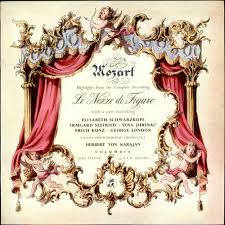
The Marriage of Figaro was the first of Mozart’s collaborations with the formidable librettist, Lorenzo da Ponte, and shows both geniuses at the height of their powers. Da Ponte based his libretto on Pierre Beaumarchais’ seminal play of the same title. With its topical references and oblique indictment of the French aristocracy, the play was considered scandalous when it opened in 1784. Although Da Ponte and Mozart’s version, written two years later, keenly depicts the underlying tension between the sexes and social classes, it focuses less on the period’s political issues and more on the complex humanity of its characters. Mozart and da Ponte’s Figaro, which provides insight into the tenuousness of human relationships via hilarious situational comedy, is at once an eminently delightful, yet profoundly moving work. Mozart’s brilliant score mirrors the complex world it depicts. Full of stunning arias and intricate yet transparent ensembles, Figaro is one of the crowning achievements of one of the world’s great artists.
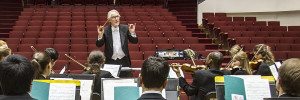
James Smith. Photo by Michael R. Anderson.

David Ronis. Photo by Luke DeLalio.
Although written before Rossini’s The Barber of Seville, The Marriage of Figaro represents the continuation of that story. In Figaro, Count Almaviva, having married Rosina, has taken to philandering. His downtrodden wife conspires with Figaro, now his valet, and Figaro’s bride-to-be, Susanna, the Count’s current amorous target, to teach him a lesson. In the process, all of the relationships in the opera are called into question and undergo both subtle and not so subtle changes. All is resolved in the end when the Countess’s love and devotion wins out as she is reunited with her repentant husband.
Viewing Figaro as a work that is intimately tied to the 18th-century, Director Ronis has assembled a design team to create a traditional setting for the production. But he also sees it as a piece with tremendous relevance today. “Even though it can be difficult for modern audiences to relate to men in frock coats and women in hoop skirts, by realistically focusing on the characters’ joys, pains, and struggles, it is possible to deliver messages of The Marriage of Figaro in a way that is both entertaining and meaningful in the 21st century,” he says.
The large cast of The Marriage of Figaro includes Joel Rathmann and alumnus Benjamin Schultz, who will split performances of the title role; Erin Bryan and Anna Whiteway as Susanna; Brian Schneider and Gavin Waid as Count Almaviva; and Anna Polum and Yanzelmalee Rivera as the Countess. The role of Cherubino will be split between Alaina Carlson and Kirsten Larson. In supporting roles, the production will feature Tia Cleveland and Meghan Hilker as Marcellina, alum Thomas Weis as Bartolo, Dennis Gotkowski and Fabian Qamar as Basilio, Kyle Connors and Mikko Utevsky as Antonio, Emi Chen and Emily Weaver as Barbarina, Todd Keller and Jiabao Zhang as Don Curzio.
Assisting Maestro Smith will be Kyle Knox, assistant conductor; Professor John Stowe, harpsichord continuo; Andrew Briggs, cello continuo; Chan Mi Jean and Kangwoo Jin, musical preparation; and Sara Guttenberg, chorus master.
The production will be designed by Dana Fralick, scenery and props; John Frautschy, lighting; Hyewon Park and Sydney Kreiger, costumes; and Jan Ross, wigs. The production stage manager will be Isabel Karp and the assistant director, Elisheva Pront. Additional student staff includes Sarah Kunath, master electrician, and Emi Chen, costume assistant.
Tickets are $25.00 for the general public, $20.00 for senior citizens and $10.00 for UW-Madison students, available in advance through the Campus Arts Ticketing office at (608) 265-ARTS and online at http://www.arts.wisc.edu/ (click “box office”). Tickets may also be purchased in person at the Wisconsin Union Theater Box Office Monday-Friday, 11:30 a.m.-5:30 p.m. and Saturdays, 12:00-5:00 p.m. and the Vilas Hall Box Office, Monday-Friday, 11:30 a.m.-5:30 p.m., and after 5:30 p.m. on University Theatre performance evenings. Because shows often sell out, advance purchase is recommended. If unsold tickets remain, they may be purchased at the door beginning one hour before the performance.
The Carol Rennebohm Auditorium is located in Music Hall, at the foot of Bascom Hill on Park Street.
University Opera is a cultural service of the School of Music at the University of Wisconsin-Madison whose mission is to provide comprehensive operatic training and performance opportunities for our students and operatic programming to the community. For more information, please contact opera@music.wisc.edu. Or visit the School of Music’s web site at www.music.wisc.edu/
Brenda Rae, a School of Music voice alumna whose 2013 U.S. operatic debut in the Santa Fe Opera’s production of Giuseppe Verdi’s “La Traviata” received high praise from the New York Times, will star this September in a major fundraising concert for University Opera.
“Ms. Rae soared beautifully in the early going, but it was in her pianissimo singing that she really shone,” wrote James R. Oestreich, of Brenda’s role as Violetta, the high-class prostitute dying of consumption.
Listen to Brenda sing the role of Semele at the Seattle Opera.
Brenda Rae, an Appleton native, earned a bachelor’s degree in voice from the School of Music in 2004 followed by a master’s degree and artist’s diploma from The Juilliard School. She then moved to Europe where she has performed regularly in Frankfurt, Munich, Berlin and many other cities.
The three-day event will celebrate the newly created position of Director of University Opera, funded by the recently established Karen K. Bishop Fund. Karen Bishop was the founder of Rainbow Play Systems, makers of playground equipment, but sold it in 2003 to pursue her first love, opera. She gained masters and doctoral degrees at UW-Madison, and prior to her death in January 2015 after a struggle with cancer, she asked her husband Charlie Bishop to support the university opera program.
Charlie Bishop’s initial gift of $500,000 was coupled with several hundred thousand dollars raised by local supporters, including several individual member donations and a joint board donation from Opera Props, a local support group, as well as a bequest from the estate of Margaret Winston, another longtime benefactor who died in September 2014. With Bishop’s pledge, the fund secured a dollar-for-dollar matching grant from the John and Tashia Morgridge Foundation to create the Karen K. Bishop Fund for the Director of University Opera.
This fall, the School of Music will initiate a national search for a permanent opera director.
The public portion of the three-day University Opera event includes a ticketed concert on Sunday, Sept. 27, at 7:30 p.m. in Mills Hall and a free master class on September 25. The program with the UW Symphony Orchestra includes the Concerto for Coloratura Soprano by Reinhold Glière, to be sung by Ms. Rae, La Mer by Claude Debussy, and Symphonic Dances by Sergei Rachmaninoff. The public is invited to a reception following the concert. Tickets are $25, available through the Memorial Union box office. Students are admitted free.
While at UW-Madison, Brenda Rae won the annual Concerto Competition and performed leading roles with University Opera including Constance in “Dialogues of the Carmelites,” Despina in “Cosi fan tutte,” and Nannetta in “Falstaff.”
“It was thrilling to hear a singer with Brenda’s towering vocal attributes at the beginning of her career,” says Mimmi Fulmer, professor of voice and opera, who was Brenda’s teacher at UW-Madison.
Brenda Rae, who dropped the last name Klinkert after leaving Wisconsin, was also featured in a 2014 article in the Metropolitan Opera Guild’s magazine, Opera News, following her performance in Santa Fe. “Rae proved her prima donna mettle in Santa Fe last summer, when she knocked local opera fans back on their heels with her superb Violetta in Verdi’s La Traviata, presented in a revival of Laurent Pelly’s edgy modern-dress staging from 2009,” the author, F. Paul Driscoll, wrote. “Rae bounded into the action of Act I with a fashion model’s lanky hauteur, her strikingly pale shoulders marked with a red floral tattoo, and sang as if her life depended on it.”
In the article, Brenda remembered her time at the School of Music.
“Before I was at Juilliard, when I was a student at the University of Wisconsin–Madison, I hadn’t really decided to focus on classical voice,” she said. “But my teachers there were pretty smart. By the end of my sophomore year, they had given me a scene from Sonnambula to do. And I fell in love with opera.”
The University Opera program was established in the early 1960s with Karlos Moser as director. Moser retired in 1997 and was followed by William Farlow, who retired in 2014. The position is now filled by David Ronis, visiting assistant professor of opera.
Graduates have included current Broadway star Nathaniel Stampley; Gregory Schmidt, now with the Metropolitan Opera; Jamie-Rose Guarrine, who will join the faculty of University of Massachusetts-Amherst this fall; James Kyrshak, who recently joined the Vienna State Opera; and Emily Birsan, currently performing with the Ryan Center of Chicago’s Lyric Opera, as well as many others.
For more information, please email Katherine Esposito or call 608.263.5615.
From March 13 to 17, University Opera will present Mozart’s beloved masterpiece of fantasy, The Magic Flute, in a family-friendly, exotic East-West staging. In a departure, the opera will run for four performances instead of the usual three, adding a Saturday evening that will allow lead roles will be split evenly among singers. The show will involve over 80 university singers, instrumentalists, and stage crew. The show dates are Friday, March 13, 7:30 p.m.; Saturday, March 14, 7:30 p.m.; Sunday, March 15, 3:00 p.m.; and Tuesday, March 17, 7:30 p.m.
Buy tickets online or in person at the Memorial Union Box Office.
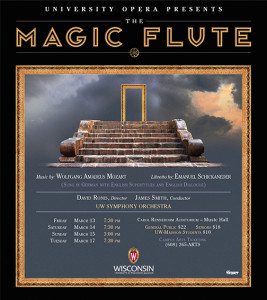
The Magic Flute will mark interim opera director David Ronis’s second production at UW-Madison. Ronis recently earned distinction when his 2014 production of Dialogues of the Carmelites at Queens College in New York was awarded third prize in the National Opera Association’s Opera Production Competition. He will be joined at the helm by James Smith, conducting the UW Symphony Orchestra.
Full of surprises and delights, The Magic Flute is a treat for both seasoned opera lovers and those new to opera. The familiar plot centers on Prince Tamino, sent by the Queen of the Night to rescue her daughter, Pamina, from the Sorcerer, Sarastro. As the opera unfolds, Tamino’s quest for love evolves into one in which self-actualization becomes equally important. Along for the ride are Papageno, his comic sidekick, searching for his own soul mate; the Queen’s Three Ladies; Three Spirits who serve as guides; and an assortment of other memorable characters.
Ronis comments about his concept for The Magic Flute: “When planning the production, I kept seeing Sarastro and his Masonic principles as being related to those of Eastern philosophy. So, in order to create the polarity between the opposing forces of Sarastro and the Queen of the Night, I characterized Sarastro as coming from the East vs. the Queen of the Night, coming from the cultural West. Thus, the Queen and her Ladies wear Victorian bustle dresses, while the basic costume for Sarastro’s followers is the shalwar kameez, the traditional garment of South and Central Asia. To complement this, the scenic design combines pan-Asian, Victorian, and surreal elements with a few contemporary comedic references thrown in. This works nicely, framing the story as well as creating an exotic environment in which the fantasy can take place.”

David Ronis. Photo by Luke DeLalio.
The large cast of The Magic Flute includes Thomas Leighton and William Ottow, who will split the performances as Tamino, Nicole Heinen and Anna Whiteway as Pamina, and Joel Rathmann and Brian Schneider as Papageno. The Queen of the Night will be played by Sarah Richardson and alumna Olivia Pogodzinski, and the role of Sarastro will be taken by alumnus Thomas Weis. The six singers playing the Three Ladies will be Susanna Beerheide, Tia Cleveland, Jessica Kasinski, Kirsten Larson, Heather Richardson, and Sheila Wilhelmi. Rounding out the cast will be Alaina Carlson, Eileen Peterson, and Emily Weaver as the Three Spirits; Emi Chen and Gaby Klugman as Papagena; Nathaniel Greenhill and Michael Hoke as Monostatos; alumnus Benjamin Li as the Speaker; Mikko Utevsky as the Second Priest; and Evan Esslinger and Fabian Qamar as the Armored Men. Assisting Maestro Smith will be Kyle Knox, assistant conductor; Seungwha Baek and Chan Mi Jean, musical preparation; and Dennis Gotkowski, chorus master.
The physical production will be based on designs by Charles “Jen” Trieloff II and realized by Joseph Varga, Greg Silver, and Liz Rathke. Costume design is by Sydney Krieger, Hyewon Park and Sam Fleming, lighting design by Rob Stepek, props design by Dana Fralick, and the production stage manager will be Erin McDermott. Student staff include Emi Chen, costume assistant; Fabian Qamar, props assistant; Emily Hake and Melanie Treuhaft, scenic painters; Briana Miller, master electrician; and Kyle Baldauf, assistant carpenter.
This production of The Magic Flute is dedicated to the memories of Karen K. Bishop and Charles Jennings Trieloff II. Ms. Bishop was an UW-Madison alumnus who performed in a number of University Opera productions between 2007 and 2011. Mr. Trieloff was the original set designer for the production.
Tickets are $22.00 for the general public, $18.00 for senior citizens and $10.00 for UW-Madison students, available in advance through the Campus Arts Ticketing office at (608) 265-ARTS and online at http://www.uniontheater.wisc.edu/location.html. Tickets may also be purchased in person at the Wisconsin Union Theater Box Office Monday-Friday, 11:30 a.m.-5:30 p.m. and Saturdays, 12:00-5:00 p.m. and the Vilas Hall Box Office, Monday-Friday, 11:30 a.m.-5:30 p.m., and after 5:30 p.m. on University Theatre performance evenings. Because shows often sell out, advance purchase is recommended. If unsold tickets remain, they may be purchased at the door beginning one hour before the performance. The Carol Rennebohm Auditorium is located in Music Hall, at the foot of Bascom Hill on Park Street. University Opera is a cultural service of the School of Music at the University of Wisconsin-Madison whose mission is to provide comprehensive operatic training and performance opportunities for our students and operatic programming to the community.
For more information, please contact opera@music.wisc.edu.
David Ronis, the visiting director of University Opera at the UW-Madison School of Music, doesn’t want his opera singers to just “park and bark” their arias. He wants them to truly express the various hidden narrative levels of the opera’s libretto and musical score.
In short, he wants them to act as actors do.
It’s not a new idea, Ronis says. In fact, he says, the overall trend in opera over the last 30 years has been for opera singers to develop acting skills as keen as their vocal ones–and he considers himself to be part of that movement.

David Ronis. Photo by Luke DeLalio.
At one point, working in this way was a departure for Ronis himself. He’d been singing professionally in opera for years before he landed a job in the Los Angeles company of Disney’s Beauty and the Beast, where he suddenly was surrounded by actors with real technique. After three years there he returned to New York and began to study acting seriously and added acting jobs – spoken theater, commercials, and independent films – to his resume.
It was life-changing. He began to look at operatic acting with new eyes, and discovered he was a bit embarrassed by the quality of much of the work that he saw.
“So I joined some friends – other teachers and directors – whose mission in life was to train opera singers to become better actors,” Ronis says. “And my background, being a singer myself as well as a trained actor, has facilitated that. So that’s what I work on now: how to use yourself, your imagination, your emotions, and your body, to act the story more effectively.”
For Albert Herring, this season’s University Opera production and Ronis’s first at UW-Madison, that means detailed stage work. “Comedy is harder than drama,” he says. “When you’re singing an aria about how lonely you are and how you want to commit suicide, it usually has a slower, more sustained inner tempo. Although the emotions are intense, it doesn’t require the same kind of technical skill as comedy.”
“In comedy, things happen quickly. Characters exchange thoughts, react to each other, and things are constantly bouncing back and forth,” he continues. “So we’re spending a lot of time working on those interchanges, and how they manifest in action. The trick is to do it cleanly and with proper timing.”
What does Ronis find funny? “I love comedy that arises out of situation,” he says. “The first time I saw the play Noises Off, I thought I had died and gone to heaven. I also have a few favorite standup comedians – Chris Rock, Kathy Griffin, Louis CK – as well as few sitcoms like ’30 Rock’ that I think are deeply funny. The classic TV comedies from the 50s and 60s are fantastic! Yesterday, in rehearsal, I found myself saying to one of the students, ‘Okay, you’re Lucy! This is a Lucy moment!’ ”
Did they have any idea what you were talking about? “They did! Yes!”
Learn more about University Opera’s Albert Herring, including how to buy tickets.
We asked David to tell us a bit more about this background and his plans for the UW-Madison School of Music. Here’s his response.
Q: Welcome to Madison, David! You’re such a New Yorker – how does it feel to be in the Midwest?
A: I’ve actually spent quite a bit of time in the Midwest. When I was actively performing, I sang all over the country, frequently spending a good month or more in a given city. So I got pretty comfortable living outside of New York. I’ve been to Wisconsin a number of times – I sang at both the Skylight and Florentine Opera companies as well as on tour with the New York City Opera National Company in Madison (at the Oscar Mayer Theater) And also in Platteville!
Q: Did you have any connections with the School of Music before you came here?
A: Yes, my good friends Paul and Cheryl Rowe have been here for 16 years. Paul is on the voice faculty and Cheryl is a terrific singer and voice teacher in her own right. It was Paul and Cheryl who encouraged me to apply for the interim position. And I’m glad they did!
Q: What are your plans this year for University Opera?
A: Well, we’ve selected two shows that I think are perfect for the UW students and for the community. In October, we’re doing Benjamin Britten’s Albert Herring and in March, Mozart’s masterpiece, The Magic Flute. Albert Herring is a terrific comedy with a social message or two that’s truly an ensemble piece. Technically, it’s a chamber opera, because the orchestra consists of only 13 players.
Albert Herring is also a perfect piece for the intimate Music Hall at UW-Madison which seats 380. Grand opera it isn’t. What it is, is a terrific opportunity for young singers and instrumentalists to develop their skills and put on an entertaining, meaningful work. We’re very happy to bring this piece to the Madison community. The conductor for Albert Herring is Kyle Knox, a remarkably talented graduate student, studying with orchestra conductor James Smith. It’s been a delight collaborating with Kyle on this project and I look forward to working with Jim in the spring.
I actually have a special connection with this work. When I was a young singer, I had the opportunity to travel to the Britten-Pears School in Aldeburgh, England in order perform the title role of Albert Herring as well as to study it with Peter Pears, the original Albert. It was a minimal workshop production, directed by Eric Crozier, Britten’s librettist, and Nancy Evans, another original cast member, yet quite memorable for me. I’m very happy to share my one degree of separation from the creation of the work with UW students. It was fantastic to do Albert Herring in the part of England where it not only takes place, but where Britten, Pears, Crozier and the English Opera Group lived and worked.
The spring production, The Magic Flute, will be sung in German with English dialogue. Since we have a full orchestra for the spring production, I wanted to do a piece that had a fairly large cast and chorus, thus offering lots of opportunities for UW students to perform. The Magic Flute is the perfect piece – well-loved and family friendly. One of our missions is to develop new, young audiences, and this opera goes a long way to accomplish that task. We look forward to bringing this work to the Music Hall.
Q: As a Visiting Assistant Professor with a one-year appointment, how do you see your role, as far as continuing and developing University Opera?
A: It’s an interesting position to be in. This is truly a year of transition for University Opera. After 16 successful years under William Farlow, I want to make sure that the program continues to grow and develop. One year is long enough to begin a few new initiatives that will hopefully be continued in the years to come. At the top of my list are the program’s educational priorities – to provide ways to help students develop their skills and to provide performance opportunities for them. In order to involve as many students as possible in the program, we’ve double cast some roles in Albert Herring and I’m expecting to do the same in The Magic Flute. As part of the Opera Workshop class (which produces an Opera Scenes program twice a year in addition to the mainstage productions), I’ve started teaching an Acting for Singers class. Seeing that my personal mission has been to develop better acting standards among opera singers, I’m excited to have the opportunity to help the students with their stage skills. Also, pursuing the part of the mission of University Opera that values community service, I would like to reach out to various arts and civic groups, both on campus and off, to see what kinds of collaborations may be possible – connections that would be mutually beneficial.
Q: Do you have any other observations regarding University Opera or the School of Music in general?
A: Well, I continue to be impressed with the students. They seem hungry for knowledge and to develop their skills. As a group, they are very hard working, and I think that you’ll see the results in performance. Susan Cook, the Director of the School of Music, Ben Schultz, the Assistant Director, and the other administrative staff have been very welcoming and helpful as I adjust to new systems and procedures. Likewise the School of Music faculty members I’ve met. I’m very happy to be among this group and look forward to an exciting year!
University Opera presents Albert Herring, Benjamin Britten’s entertaining ensemble comedy with a social message
On October 24, 26, and 28, University Opera will present its first operatic production of the season, Albert Herring, composed in 1947 by Benjamin Britten. The libretto is based on Guy de Maupassant’s novella Le Rosier de Madame Husson, and was written by Eric Crozier. It was premiered in 1947 at Glyndebourne Festival Opera in East Sussex, England, and received its first United States premiere at Tanglewood in 1949. It has been called the greatest comic opera of the century.
It will mark the first opera staged under the direction of David Ronis, visiting director of opera at UW-Madison. Read about David Ronis’s new ideas for University Opera.
The opera will be performed in Music Hall, 925 Bascom Mall, on Friday, October 24 at 7:30 p.m., Sunday, October 26 at 3 p.m., and Tuesday, October 28 at 7:30 p.m.
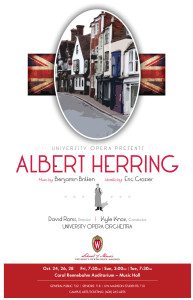
The story begins when the town council in the small English village of
Loxford, motivated by the formidable Lady Billows, meets in order to select a “chaste and virtuous” Queen of the May. When no young ladies can be found that fit the bill (scandale!), they decide to choose a King of the May instead. The young man they select is the nerdy Albert Herring. Henpecked by his mother, Albert dreams of going out on his own. For the moment, however, he does not have the emotional wherewithal to break loose from her tether. That changes when his contemporaries, Sid and Nancy, spike his drink during the celebration. Under the influence of alcohol, he conquers his inhibitions and disappears overnight. The next morning, the whole town believes him to be dead. But Albert, of course, reappears and proceeds to tell them all off. Thus, Britten’s opera is both a coming of age story as well as one that gently examines the nature of hypocrisy in modern society.
Although originally set in 1900, the University Opera production transports Albert Herring to 1947, the year it was written. At that time, England was still reeling from the hardships of World War II. By setting the opera at the the time of its creation, University Opera hopes
to reflect some of the social and economic challenges faced by Britten and
his colleagues when they started the English Opera Group. Some of Britten’s most important work dates from this period in which he wrote for the same forces of 13 instrumentalists and a small group of singers, and consequently made a huge contribution to the genre of the chamber opera.
The 13-character cast of Albert Herring features William Ottow and Joshua Sanders in the title role, as well as Jessica Kasinski and Tyana O’Connor as Lady Billows. Additionally, the production will include Alaina Carlson and Jennifer DeMain as Nancy, Brian Schneider as Sid, Joel Rathmann as the Vicar, Tia Cleveland as Mrs. Herring, Sheila Wilhelmi as Florence, Dennis Gotkowski as the Mayor, Emi Chen as Emmie, Emily Weaver as Cis, and Nicole Heinen and Sarah Richardson as Miss Wordsworth. Three local performers join the cast – Rick Henslin as Superintendent of Police Budd, as well as Michael Chiaverini and Eli Kuzma, boys who sing in the Madison Youth Choir, splitting the role of Harry. The instrumental forces for Albert Herring will be the University Opera Orchestra, conducted by Kyle Knox, with musical preparation by Mr. Knox, Chan Mi Jean, and Thomas Kasdorf.
The production staff include scenic designer Stephen Hudson-Mairet, costume designers Sydney Krieger and Hyewon Park, lighting designer Jordan Kardasz, prop designer Dana Fralick, scene painting advisor Liz Rathke, technical director Greg Silver, and production stage manager Erin McDermott. Student staff include Emi Chen, costumes; Katie Oliver and Fabian Qamar, props; Melanie Treuhaft, scene painter; Briana Miller, master electrician; and Lukas Heins, assistant carpenter.
Tickets are $22.00 for the general public, $18.00 for senior citizens and $10.00 for UW-Madison students, available in advance through the Campus Arts Ticketing office at (608) 265-ARTS and online at http://www.arts.wisc.edu/ (click “box office”). Tickets may also be purchased in person at the Wisconsin Union Theater Box Office Monday-Friday, 11:30 a.m.-5:30 p.m. and Saturdays, 12:00-5:00 p.m. and the Vilas Hall Box Office, Monday-Friday, 11:30 a.m.-5:30 p.m., and after 5:30 p.m. on University Theatre performance evenings. Because shows often sell out, advance purchase is recommended. If unsold tickets remain, they may be purchased at the door beginning one hour before the performance. The Carol Rennebohm Auditorium is located in Music Hall, at the foot of Bascom Hill on Park Street.
University Opera is a cultural service of the School of Music at the University of Wisconsin-Madison whose mission is to provide comprehensive operatic training and performance opportunities for our students and operatic programming to the community. For more information, please contact opera@music.wisc.edu.


